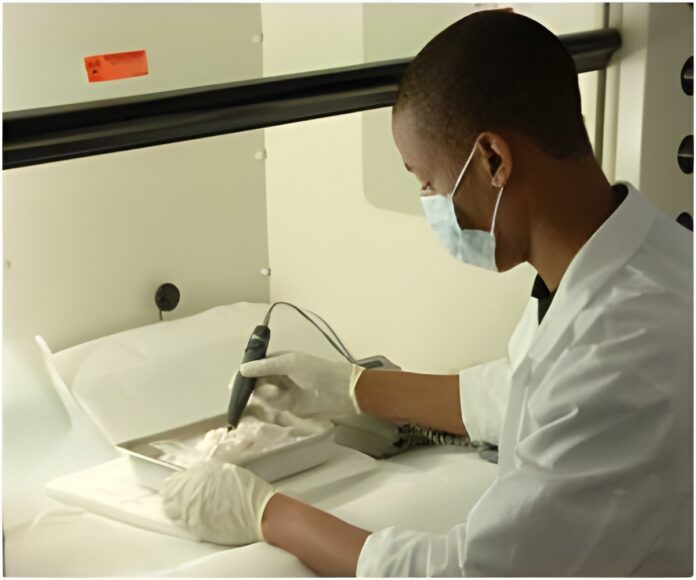ELOVL2 enzyme helps produce vital fats; its decline with age weakens immune cell development.
As we age, our immune system weakens, producing fewer cells that fight infection and aid recovery. While the exact cause has remained unclear, a new study in GeroScience may offer answers. “We still don’t fully understand why antibody-producing cells decline with age,” said Dr. Leslie Crews of UC San Diego School of Medicine. ()
Crews’ team, working with UC Irvine researchers, discovered that reduced activity of the enzyme ELOVL2 (short for “elongation of very long chain fatty acids-like 2”) accelerates age-related immune decline. ELOVL2, which helps produce vital lipids, decreases with age—disrupting lipid balance in cells and impairing the development of B cells, the immune cells that generate antibodies.
The findings suggest that lipid metabolism may play a central role in maintaining a healthy immune system as we age.
The researchers analyzed gene and protein expression, along with lipid profiles, in the bone marrow of mice whose Elovl2 gene had been inactivated. Previous studies have shown that reduced ELOVL2 function promotes accelerated aging in other tissues, but this is the first to examine the role of the enzyme in aging immune cells.
Precision Lipid Supplementation
When the genetically altered mice were just 18-20 months old, the lack of ELOVL2 enzymatic activity decreased the expression of several genes related to B cell development in their bone marrow. In fact, their ELOVL2 activity was so reduced that it resembled that of much older control mice. The lipid profiles of these mice also resembled those of the elderly control mice, with low levels of unsaturated fats compared with saturated fats.
“ELOVL2 is a key enzyme necessary for synthesis of the omega−3 fatty acid DHA, one of the main components of all cell membranes,” said co-corresponding author Dorota Skowronska-Krawczyk, an associate professor in the Department of Physiology and Biophysics and the Department of Ophthalmology, and faculty member in the Center for Translational Vision Research at UC Irvine School of Medicine. “We believe that DHA keeps the cell membranes in the stem cell precursors of B cells flexible and resilient.”
With ELOVL2 depleted, the mice were unable to produce as many functional B cells as healthy mice of similar age.
“This loss was directly linked to changes in fat (lipid) metabolism, causing a complete shift in membrane composition and fluidity, ultimately accelerating immune system aging,” said first author Silvia Vicenzi, Ph.D., a California Institute for Regenerative Medicine (CIRM) postdoctoral fellow at UC San Diego School of Medicine, in a video related to the study.
To assess the applicability of the mouse studies to the human immune system, the researchers analyzed gene expression data from hematopoietic (blood) stem and progenitor cells (HSPCs) from human bone marrow samples collected at various ages. Similar to the mouse studies, they found substantial reductions in the expression of a gene called CD79B in older humans, along with a near-total loss of ELOVL2-expressing HSPCs in people more than 60 years of age.
“The same immune cell population that disappeared in our mutant mouse model was also dramatically reduced in the elderly human population,” Vicenzi said.
With ELOVL2 non-functional, the complement of lipids changes, negatively affecting the cells responsible for fighting infections, according to Crews.
Among the researchers’ other discoveries: when Elovl2 isn’t produced properly, cells are “in a reduced state of metabolic fitness,” Crews said. “What was even more surprising was that a normal diet is not enough to overcome the changes at the genetic level.”
This finding suggests that older individuals may be able to counteract the effects of age on their immune system via precision lipid supplementation tailored to their specific needs. A large number of patients could potentially access this type of intervention. But more research is needed to determine whether the necessary fatty acids would be effective when taken orally, or if they would need to be delivered via another route to avoid degradation by the digestive tract, Crews cautioned.
Gene therapy may also be worth exploring, the researchers noted. In a previous study, Skowronska-Krawczyk and her colleagues demonstrated that enhancing Elovl2 gene expression in aging mice boosted DHA levels in the eye, resulting in improvements to vision. The researchers plan to investigate whether targeting ELOVL2 activity could enhance immune function.
The study also suggests that lipid metabolism may play a role in blood cancers, with promising implications for the treatment of these diseases. The CD79B gene and other B cell-related genes affected by ELOVL2 enzymatic activity (PAX5, IRF4) are frequently mutated or abnormally activated in lymphoid malignancies such as lymphoma and multiple myeloma. Given this, therapeutically targeting the ELOVL2 gene could potentially impair cancer progression, according to the researchers.
“We believe that by studying the biology of aging, we can find new therapies to prevent age-related diseases and increase the human healthspan,” Skowronska-Krawczyk said.
Reference:
- Systemic deficits in lipid homeostasis promote aging-associated impairments in B cell progenitor development – (https://link.springer.com/article/10.1007/s11357-025-01594-w)
Source-Eurekalert


